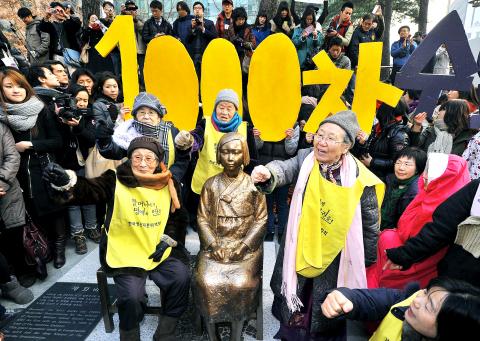South Korean women forced into wartime sexual slavery held their 1,000th weekly protest outside Japan’s embassy yesterday, demanding compensation and an apology from Tokyo as they have since 1992.
“Apologize!” shouted five women in their 80s or 90s and an estimated 500 supporters, waving banners reading “Compensate” and “Admit the war crime.”
Demonstrators campaigning to publicize World War II crimes braved near-freezing temperatures to unveil a “peace monument” across the street from the mission, despite protests from the Japanese government over the statue.

Photo: AFP
The five former sex slaves known euphemistically as “comfort women” hugged the replica of a teenage Korean girl in traditional costume.
“Young girls were dragged to other countries as slaves of the Japanese military,” said a frail Kim Bok-dong, 85. “I demand that the ambassador of Japan tell the Japanese government to apologize before we all die.”
The oldest of the Korean former “comfort women” died earlier this month aged 94 and another aged 87 died on Tuesday, leaving just 63 survivors out of 234 who had registered with the Seoul government.
In a rare move, a North Korean association for former comfort women sent a letter of support.
“The Wednesday demonstration that has lasted for 20 years is an unbearable blaze of anger against sexual slavery crimes committed by Japan that have trampled on national pride,” the group said in a faxed message.
Historians say that during World War II, about 200,000 women from Taiwan, Korea, China, the Philippines and other countries were drafted to work in Japanese military brothels.
The issue came to widespread notice in the early 1990s after some victims found the courage to go public.
Japan has apologized for the military’s crimes against the women, but denies official responsibility for running the brothels. It has rejected South Korea’s proposal of bilateral talks about the women’s demands.
South Korea’s foreign ministry said on Tuesday it was inexcusable that the issue was still not settled.

‘TERRORIST ATTACK’: The convoy of Brigadier General Hamdi Shukri resulted in the ‘martyrdom of five of our armed forces,’ the Presidential Leadership Council said A blast targeting the convoy of a Saudi Arabian-backed armed group killed five in Yemen’s southern city of Aden and injured the commander of the government-allied unit, officials said on Wednesday. “The treacherous terrorist attack targeting the convoy of Brigadier General Hamdi Shukri, commander of the Second Giants Brigade, resulted in the martyrdom of five of our armed forces heroes and the injury of three others,” Yemen’s Saudi Arabia-backed Presidential Leadership Council said in a statement published by Yemeni news agency Saba. A security source told reporters that a car bomb on the side of the road in the Ja’awla area in

PRECARIOUS RELATIONS: Commentators in Saudi Arabia accuse the UAE of growing too bold, backing forces at odds with Saudi interests in various conflicts A Saudi Arabian media campaign targeting the United Arab Emirates (UAE) has deepened the Gulf’s worst row in years, stoking fears of a damaging fall-out in the financial heart of the Middle East. Fiery accusations of rights abuses and betrayal have circulated for weeks in state-run and social media after a brief conflict in Yemen, where Saudi airstrikes quelled an offensive by UAE-backed separatists. The United Arab Emirates is “investing in chaos and supporting secessionists” from Libya to Yemen and the Horn of Africa, Saudi Arabia’s al-Ekhbariya TV charged in a report this week. Such invective has been unheard of

US President Donald Trump on Saturday warned Canada that if it concludes a trade deal with China, he would impose a 100 percent tariff on all goods coming over the border. Relations between the US and its northern neighbor have been rocky since Trump returned to the White House a year ago, with spats over trade and Canadian Prime Minister Mark Carney decrying a “rupture” in the US-led global order. During a visit to Beijing earlier this month, Carney hailed a “new strategic partnership” with China that resulted in a “preliminary, but landmark trade agreement” to reduce tariffs — but

SCAM CLAMPDOWN: About 130 South Korean scam suspects have been sent home since October last year, and 60 more are still waiting for repatriation Dozens of South Koreans allegedly involved in online scams in Cambodia were yesterday returned to South Korea to face investigations in what was the largest group repatriation of Korean criminal suspects from abroad. The 73 South Korean suspects allegedly scammed fellow Koreans out of 48.6 billion won (US$33 million), South Korea said. Upon arrival in South Korea’s Incheon International Airport aboard a chartered plane, the suspects — 65 men and eight women — were sent to police stations. Local TV footage showed the suspects, in handcuffs and wearing masks, being escorted by police officers and boarding buses. They were among about 260 South